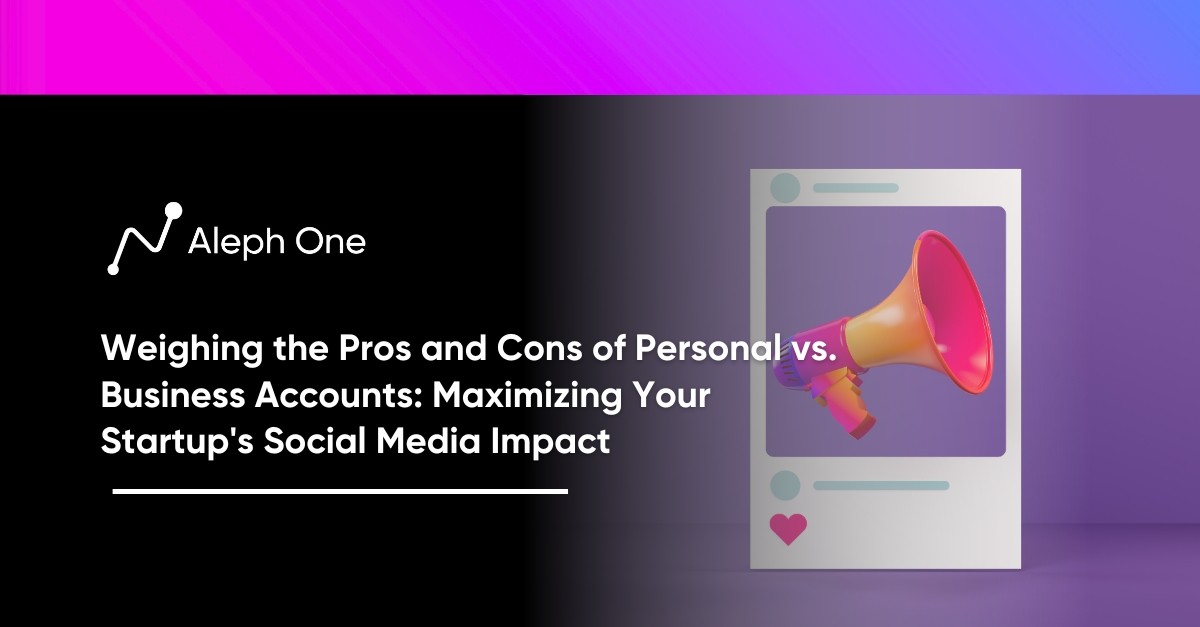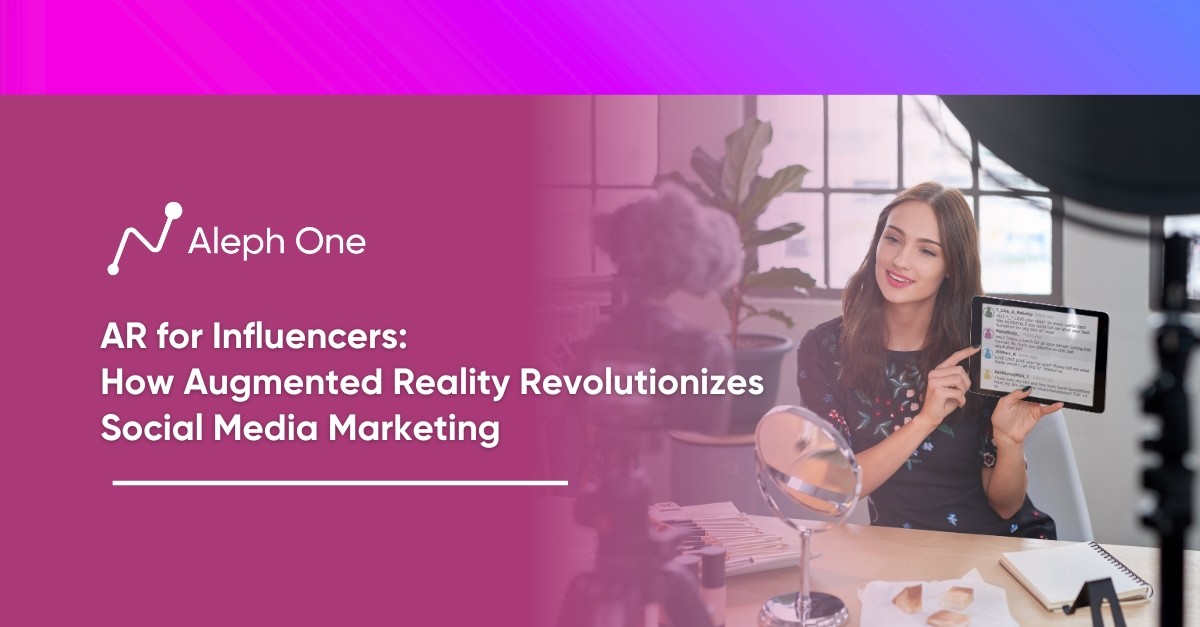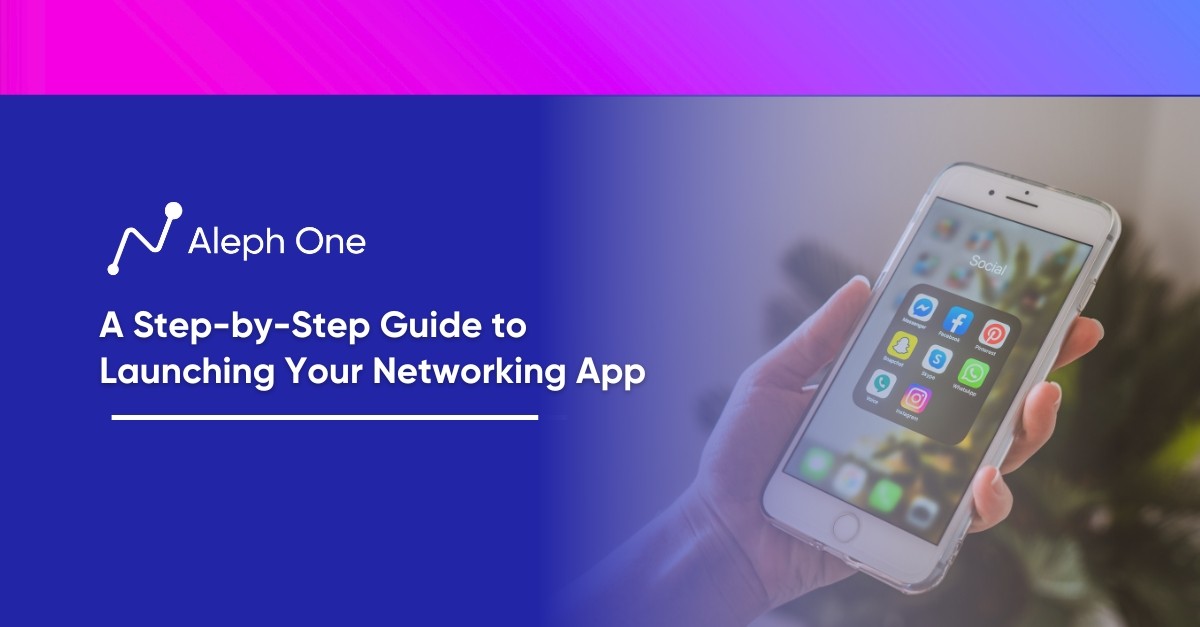Let’s work together to build something amazing. Share your project details and our team will reply to figure out the next steps to your success.

Social media has become integral to every business’s marketing strategy, but whether to use personal or business accounts remains. This article delves into the pros and cons of both approaches, focusing on the authenticity factor that personal accounts bring. Highlighting examples like Richard Branson and Wendy’s showcases the power of personal accounts in building genuine connections with consumers. However, also discusses the perils of mixing personal and professional lives, emphasizing the need for caution and privacy. On the other hand, separate business accounts offer professionalism and control, making them a safer choice for many brands. Balancing personality and professionalism is crucial for maximizing social media influence and achieving startup success.

The Authenticity Factor: Why Personal Accounts Win
Authenticity and relatability are key. Consumers crave a behind-the-scenes look at the real people behind brands. Personal social media accounts, where company leaders and employees share aspects of their lives, are an ideal way to build that sense of authentic connection.
Richard Branson and The Virgin Group
Richard Branson, Virgin Group founder, has over 20 million followers on LinkedIn and frequently shares updates from his adventures, thoughts on entrepreneurship, and life experiences. His unfiltered, personal posts help to humanize the Virgin brand and build loyalty among followers who feel they have insight into Branson’s character.
Wendy’s Social Media Success
Wendy’s is another brand that has succeeded with a personalized social media approach. The fast food chain has become known for its sassy, comedic tweets, often poking fun at competitors in a good-natured way. The lighthearted, casual banter makes Wendy’s feel more like an old friend than a faceless corporation. The account has amassed over 2 million followers, demonstrating how a personal, relatable brand voice can turn a company into a social media sensation.
Personal Accounts Risks to Professionalism and Privacy
When individual employees have autonomy over social media, they may share too much personal information or post in ways that reflect poorly on the brand. There is uncertainty over who “owns” the account and its followers. This highlights why some brands prefer a more detached, formal approach to social media using dedicated business profiles.
While personal social media accounts can be highly impactful in building trust and loyalty, they require caution and oversight. For some companies, separate business profiles may be safer for crafting a professional digital image. But for brands able to find the right balance of personality and professionalism, personal accounts can be a powerful way to maximize social media influence.
The Perils of Mixing Business with Personal
While personal social media accounts can help build authentic connections with customers, they also threaten to maintain a professional image and privacy. When business and personal lives are mixed on social media, it can be off-putting for some audiences and damage a company’s brand.
Personal Accounts Can Alienate Potential Customers
Sharing too many personal photos, relationship updates, or other intimate details on an account to promote a business can alienate potential customers. They may see the company as unprofessional or the owner as distracted. The line between personal and professional can quickly become blurred, and it may be difficult for account owners to recognize when sharing too much personal information.
Privacy Risks with Personal Social Media Accounts
Privacy is also a concern with personal social media accounts. When business and personal profiles are combined, private details about an individual’s life, family, relationships, health issues, political views, and more become visible to the public and associated with the company brand. This could negatively impact the business if the personal information shared is controversial or polarizing. It also exposes more of the account owner’s life to scrutiny and judgment by others.
Curated Brand Image
Many major corporations maintain strictly professional social media profiles to avoid these issues. They craft a carefully curated brand image on social media focused exclusively on their products, services, company news, and customer relationships. Personal accounts are kept private and separate. This more formal approach is considered safer, even if it lacks some of the authenticity and relatability of personal accounts.
Balanced Professional and Personal Accounts
While personal social media accounts benefit from making genuine connections, they must be balanced with maintaining professional boundaries. Businesses must be cautious in how much personal information they share and be aware of the risks to privacy, brand image, and customer relationships. For some companies, separate business and personal social media profiles are the most prudent strategy.
The Case for Separate Business Profiles
Creating dedicated business social media accounts is the safer and more professional option for many startups and entrepreneurs. Separate profiles allow you to build a curated presence focused specifically on your company and brand. Everything from your profile photo and bio to your posts and messaging can be tailored to reflect your business goals.
Major Corporations Use Business Social Media Accounts
Major corporations overwhelmingly use business social media accounts rather than personal profiles. This includes tech giants like Google, Apple, and Microsoft and retail, finance, and healthcare companies. While a personal social media presence may work for a small local business, separate business accounts become critical as companies scale. They project an image of professionalism and competence that personal profiles often cannot.
Business Profiles Also Provide More Privacy and Control
Content on personal profiles is difficult to contain, and information meant to be shared with friends and family can quickly end up in the public domain. Business accounts allow you to be selective in what you share. You can craft social media content for your target customers and connections without worrying about oversharing personal details.
Social Media Manager & Community Manager
Another benefit of dedicated business accounts is that they make it easy to hand over control of the account if a social media manager or community manager comes on board. If accounts are built around a personal profile, transitioning them to another individual is complicated and can damage your social media presence. Business profiles are built to outlast any individual so that control can be transferred seamlessly behind the scenes.
While personal social media accounts have their place and can be very effective for small startups, separate professional profiles become essential as your business grows. They allow you to scale your social media presence strategically. Business accounts give you more control, privacy, and flexibility while projecting an image of competence to partners, customers, and investors. For long-term success, startups should weigh the pros and cons of personal versus business social media accounts and determine when it makes sense to transition to dedicated business profiles.
How Often Should You Post to Be Effective?
Finding the right social media posting frequency is key to maximizing your impact. Post too often, and you put annoying followers or appear spammy. Post infrequently, and you may need to be reminded or active. According to recent studies, the ideal posting frequency varies significantly depending on the platform and audience.
On Facebook, 3-4 posts per day for business pages and 1-2 posts for personal profiles is a good target. Facebook’s algorithm favors frequent posting, so more is better if the content is high quality and relevant. For Instagram, 2-3 daily posts are typical for brands and influencers. Instagram’s highly visual nature means eye-catching photos and short videos are essential.
Twitter, 3-5 tweets daily for businesses and 2-3 for individuals are standard. While Twitter moves quickly, avoid tweeting every hour, as that frequency level is unnecessary and may irritate some followers. According to Twitter, accounts that tweet three times daily or more gain the most followers. But tweeting 5-10 times daily does not provide any additional benefit and may have the opposite effect.
For LinkedIn, a more professional network, 1-2 posts per day for company pages and 3-4 posts per week for personal profiles, is recommended. The content should be career or industry-focused. Posting too frequently on LinkedIn can seem overly promotional or like spam.
These guidelines provide a good starting point, the ideal posting frequency for your social media accounts depends on your specific audience and goals. Monitor critical metrics like engagement, clicks, and follower growth to determine what frequency resonates most with your target audience.
Past Predictions That Never Came to Fruition
When social media emerged in the early 2000s, many experts predicted how it would transform businesses and marketing that never came to pass. For example, some forecasted that social media would replace traditional advertising altogether. They believed social networks would provide such a targeted way to reach consumers that broad-based ads in print, radio, and television ads would become obsolete. Of course, that never happened. While social media has disrupted specific industries, traditional advertising remains a $200 billion market in the U.S. alone.
Google+ Social Network Failure
Another common prediction was that new social networks would rapidly overtake established platforms. When Google+ launched in 2011, many speculated it would quickly eclipse Facebook and Twitter. “Google+ is poised to become the leading social network,” said ReadWrite founder Richard MacManus at the time. But within a few years, consumer interest in Google+ had fizzled. Facebook and Twitter remained dominant, and Google+ was shut down in 2019.
Whisper and Secret – Cyberbullying & Accountability
Some also foresaw the rise of anonymous social networks like Whisper and Secret. In 2014,
TechCrunch’s Josh Constine predicted anonymous apps would “become a major medium for confession and gossip” by providing an outlet for people to share without their names attached. However, these networks were plagued by issues like cyberbullying and a lack of accountability. Most never achieved mainstream success, and Secret shut down in 2015.
The hype around emerging social platforms often leads to overly optimistic predictions, the reality is that consumer habits and preferences change slowly. The social networks that have stood the test of time, like Facebook, Twitter, and LinkedIn, did so by building community and trust over many years. They have also evolved with the times, adapting their features and business models to suit the current needs of users and brands. The social networks that were unable to do so, despite the initial buzz, ultimately did not last.
The Future of Social Media: What’s Next?
Social media has fundamentally reshaped how businesses market themselves and connect with customers, but the social landscape continues evolving rapidly. Several emerging trends are poised to transform social media in the coming years further.
Live Streaming
Live streaming video is growing exponentially and allows for authentic, real-time engagement. Platforms like Facebook Live, Instagram Live, and YouTube Live make streaming accessible to brands and influencers. The ability to broadcast video in real-time and interact with viewers via comments and reactions takes social media to the next level. Brands that leverage live streaming, especially to give followers behind-the-scenes access or host Q&A sessions, will benefit from its power to build connection and loyalty.
Influencer Marketing Industry
The influencer marketing industry is also booming and poised to become more sophisticated. Brands are realizing the power of influencer collaborations to tap into their followers and appear authentic. Influencer marketing will become more data-driven and strategic in the next few years. Brands will form long-term partnerships with influencers, and new tools will help quantify the impact of influencer campaigns.
User-generated Content
User-generated content from customers and fans is an increasingly important part of brands’ social media strategies. People trust content from their peers far more than branded ads. Innovative companies are finding ways to inspire and share user-generated content through contests, hashtags, and other interactive campaigns. This trend will only grow as new tools make capturing and sharing photos, videos, and stories more accessible on social media.
Social Media Transforms Brands and Customer Engagement
While it is difficult to predict how social media will evolve in the next 3-5 years, one thing is certain: it will continue to transform how brands reach and engage with customers. Emerging technologies like virtual and augmented reality may unlock new opportunities on social media. Platforms will come and go. But the core reasons social media has become indispensable for business—its ability to build connections, raise awareness, and drive sales—will endure. Brands that stay on the edge of trends and continue optimizing their social media strategies will thrive.
Get the latest news and updates from Aleph One in your inbox.



